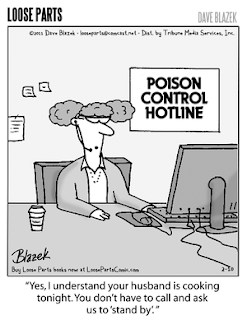
1. Tell me your
history with poison control. How long have you worked there/what is your
background:
I've worked in the West Texas Regional Poison Center since
2002. I'd originally done a rotation
here during my last year of pharmacy school.
After graduating I completed a Pediatric Pharmacy Residency and was
recruited to come back to the center by our previous directors, Leo Artalejo
and John Haynes. I worked as a
Specialist and was fortunate to become a Diplomate of the American Board of
Applied Toxicology with their support.
After Leo's retirement in 2012, I was promoted to Director.
2. What do you think
is one of the most important aspects of poison control services?
One of the most important and yet overlooked aspects of our
poison control centers' services is the immediate and direct impact that we can
make on our patients' and their families' lives. There is never a good time for an accident or
an emergency. Yet when one happens where
a loved one has been exposed to something they shouldn't, whether it be a
toddler drinking a household cleaner, a double dose on a medication, or even a
rattlesnake bite, it is great to know that people can call us and we can walk
them through what exactly needs to be done, whether that be at home or in the
hospital. Our experienced specialists
are nurses and pharmacists that can provide the most appropriate information
based on your situation. There is no
need to waste valuable time looking something up online and hoping you find the
right website.
3. What do you enjoy
most about your job and why?
What I enjoy most about working in the poison center is
being able to help so many patients. Over 80% of the time we are able to safely keep a patient at home or work by
providing them the correct information on what the actual risks are from their
situation, what signs and symptoms to monitor for, what they can do and, just
as important, what they shouldn't do. In
all those cases where we are able to keep someone out of the ER and we just made
their day. They don't have to pull the
kids from school and miss their practices or games. They don't have to miss work. They don't have to disrupt their entire day
by running to a busy and crowded ER or doctor's office and wait for hours to
be seen. Knowing that we just saved them
all that headache and worry is what I enjoy most.
4. What do you think
the public needs to know regarding poison control?
When people think of poison they most often picture the
skull and crossbones or some steaming concoction made up in a lab in an old
black & white movie. People don't
realize that anything can be a poison.
About 2/3 of our calls are regarding medications, both over-the-counter
and prescription. Many people wouldn't
consider their regular daily medication to be a poison. Yet when taken
incorrectly or by the wrong person, it most certainly can be. The same can be said for all of our household
products from your personal hygiene and beauty products found in your bathroom
and vanity to the different detergents and cleaners you keep in the laundry
room and garage. Anything can be a
poison and only the dose differentiates a poison from a cure. It doesn't matter what it is, you can call
us.
5. Share a funny
story here that might have happened on the job.
I didn't know how to bake a turkey until my first
Thanksgiving working in the poison control center. I never imagined so many things could go
wrong in baking a big bird. My
colleagues had warned me, so I'd planned to use the USDA's Meat and Poultry
Hotline as my backup. I didn't know that
they closed at noon local time! Baking
frozen turkeys, broken meat thermometers, innards left in the plastic bag in
the baking turkey, Teflon pans left in the oven, carbon monoxide and smoke
alarms going off in the home, is 8 hours at 350 degrees long enough...the calls
were non-stop. I was stuck having to
call my grandmother for advice on what to tell a few callers who'd run into
mishaps in their kitchens. After about
my third call to her, she asked, "What are you doing? I thought you were at work." Yes, this comic is so true...and I now know
how to bake a turkey!

